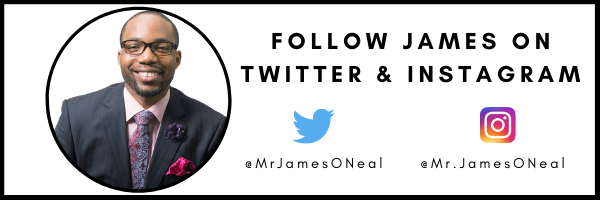TL;DR:
- Learning should not just be personal for students, but it should be personal for teachers. Teachers should be learners, too.
- Teachers should master the content so that students can have the opportunity to master what is taught.
James joined Jeff on the Daily Drop In to discuss keeping creativity alive as well as mastery in the classroom.
Fourteen years ago, I stepped into a classroom believing that I was going to change the narrative of students. I had a great passion for education and I had first hand knowledge of how powerful education can be. However, when I graduated from NC State (wolfpack baby), I had no clue how to teach 8th grade math. In fact, I had very little knowledge of the two 8am Calculus I and II courses I took my freshmen year! I definitely did not remember the intricacies of 8th grade math content!
My first year teaching was full of many hurdles. Students had many gaps in their content knowledge and that really caught me off guard. I remember teaching integers and students had a hard time grasping -7 – 5. Many of my students said the answer was -2 or 2.
When I was in school my teacher told me to just turn every subtraction sign to a plus minus sign and that would help with subtracting integers. Therefore -7 – 5 would be -7 + -5 which would be -12. Yet, I was entering a transitional time in education where math was more than algorithms and neat tricks; we had to bring meaning to learning! This approach to mathematics teaching was a game changer! The only problem was…NO ONE taught me how to play this new game of connecting meaning to learning.
When I became vulnerable and I stopped avoiding the problems that stretched my content knowledge, I was more apt to believe my students could rise to any challenge I put before them. Share on XIn college there was not a class on how to teach middle school math!
So I did what most teachers do today…look how to teach the “why.”
We live in a time and age where students want to know “why” even though many times they are really asking “why do I have to learn this?” Or, here’s a good one, “When am I ever going to use this in life?” My answer, “today!” ? ?
Students really believe that I have a crystal ball in which I can see their future and know exactly when they will use The Pythagorean Theorem. Math is about making connections to patterns and persevering through those connections so that the learning is personalized through productive struggle.
Learning should be personal.
Learning should not just be personal for students, but it should be personal for teachers. When I saw that my students struggled with certain content, I took it personally and researched ways in which I could present that math more simplistically and not lose the rigor of the grade-level content. Research does not have to be peer reviewed journals. Those scholarly texts have their place.
However, research may look like you asking for tips from teachers who have had success teaching your content. With the advancement of technology, research may look like Googling or searching YouTube for a video. It is our responsibility to master our content so that students can have the opportunity to master what you are teaching. I say opportunity because when we are intimidated or lacking in content knowledge, students do not get access to subject matter because we are the gatekeepers of the learning environment.
[scroll down to keep reading]
How can students master a subject when we have not subjected ourselves to process of content mastery?

Engaged Students
I am not denying the other aspects that goes into great teaching. We know great teaching includes building relationships, supporting the whole child, establishing a dynamic classroom culture, structure, prep, bladder-holding, etc.! It is dually important to note that we cannot exclude mastery.
I believe that teachers who master their content:
- Do the work of the lessons/units.
- Anticipate misconceptions and build scaffolds to support student learning.
- Reflect on their success and failures and adapt to students’ needs.
- Are open to new ways and ideas that allow students to achieve mastery.
When I became vulnerable and I stopped avoiding the problems that stretched my content knowledge, I was more apt to believe my students could rise to any challenge I put before them. My exposure to the coherence of my content made me a better teacher which also benefited my students because I gave them access to what I accessed.
The teacher must also be a learner!
About James O’Neal
James O’Neal, Jr has entered his fourteenth year of teaching middle school math. He taught eight years in Pittsburgh, Pennsylvania and the current six, in Charlotte, North Carolina at Piedmont IB Middle School. In 2018, James became a National Board-Certified teacher and Piedmont’s Teacher of The Year! James received his M.Ed. in Curriculum and Instruction with a concentration in middle school mathematics from UNC-Charlotte in May of 2020.
In 2021, James was named a North Carolina finalist of the Presidential Award for Excellence in Mathematics and Science Teaching (PAEMST), the highest award that a math teacher can receive in the country. His drive to be an excellent educator comes from the first-hand experience of his 8th grade math teacher inviting him into Algebra 1. James’ life changed forever! James saw that teachers wielded the power of access through what “they” expected from their students. As one of two black boys in the classroom, he realized others needed access. The memory of this experience, and many like it, inspired James to start Mastery For All, LLC.
James shared this message of high expectations, excellent teaching, and equitable outcomes through Teacher Talks, a platform sponsored by the CMS (Charlotte Mecklenburg Schools) Foundation. James now shares his heart-message across the country. It is his desire to cultivate an atmosphere where students believe that they can, educators believe that students can, and parents have the resources and relationship with stakeholders to support their child, who can achieve mastery. Mastery, for all!


